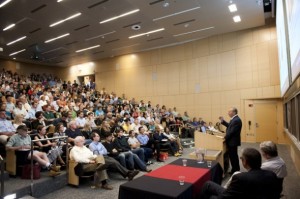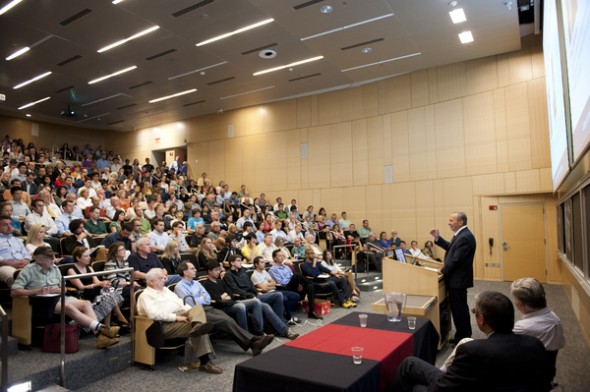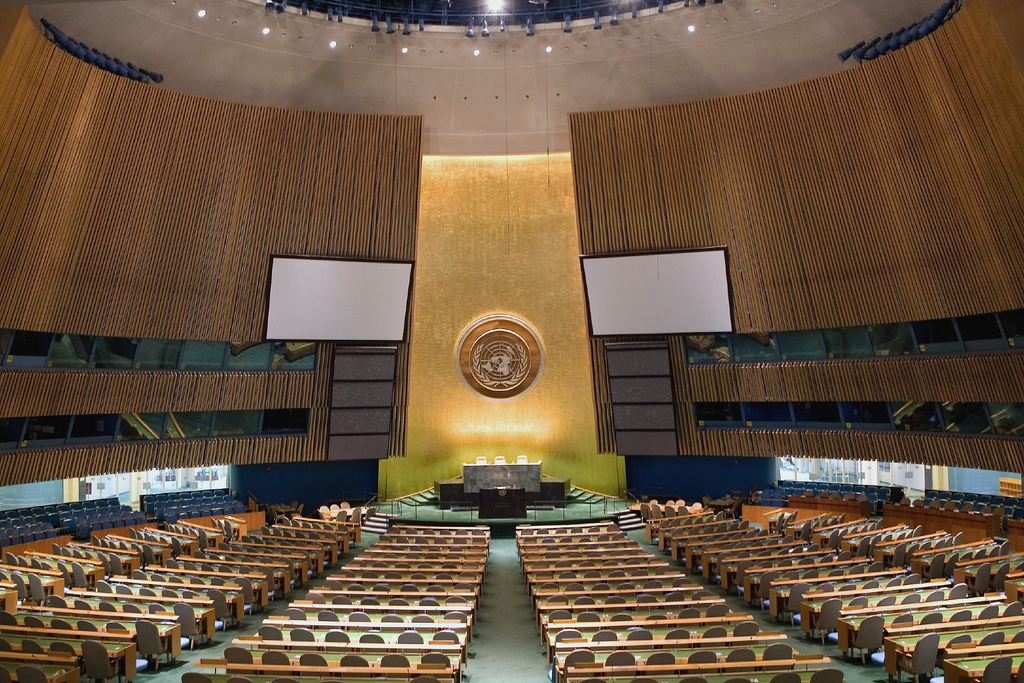
Northeastern’s School of Public Policy and Urban Affairs is hosting an Open Classrooms series on “Policy Advice to the President.” The series is in debate format, two experts in a specific field give separate responses to a posed question, and field questions from the audience. Commencing the season’s series was Larry Summers and Greg Mankiw, on economic recovery and fiscal policy.
Since the 2008 financial crisis, the US has experienced a 36-month long recovery. The pace, effectiveness, and direction of this recovery is arguably threatened. Data published by the Council on Foreign Relations (CFR) show that: relative to Real Gross Domestic Product (RGDP), the recovery is under the postwar recession recovery average; nominal housing prices continue to decline; household debt stock relative to end of recession is diving deeper into the red; and our industrial capacity relative to end of recession is dipping.
However, the decline is not that transparent. The change in decline relative to the end of recession is arguably insignificant in several of CFR’s graphs. To look at the status quo, without the change in decline skews the economic direction of the country because it is not properly conditionalized. If we started at a worse-off position, how can the economy be expected to exceed postwar levels?
Summers and Mankiw each took their time to contextualize the financial crisis in order to justify their vision of recovery, a critical piece to the equation in this debate.
Larry Summers served as the Secretary of the Treasury under Bill Clinton, as the President of Harvard University for five years, and as the director of the White House National Economic Council. His career in government management was not only apparent the substance of his arguments, but in his rhetoric as well. Well organized and well articulated, Summers’ outline defined the economic downturn by businesses’ excess capacity, decreasing demand, and the growth in national debt surpassing the growth of GDP. To tackle these issues, Summers emphasized the framework of short-term and long-term solutions.
In the short-term, policies need to focus on putting Americans back to work. Even though the American Recovery Act (ARA) “cushioned the blow” of the recession, 3 million more are working today because of it, private employers continue to find themselves unable to borrow and spend in order to finance the expansion of the labor force. To retract on any of ARA’s cushions “would be madness,” said Summer, and that now is not the time to launch austerity measures. We must spend to get out of the recession; what is fatal is not taking the prescribed dosage.
Summers contends that what we need to spend on are public investments. The conditions for public investments are “too good to pass up”. The government can borrow money, in a currency we print, for 30 years at an interest rate below 3%. Summers asks, “What better time is there to fix a gateway into our country, to fix Kennedy airport?” Public investments must stretch beyond infrastructure, into education, public assistance programs, and so on. He cited economist Doug Elmendorf’s theory that we can reduce military and discretionary spending by 25% or raise taxes by ⅕ to keep the economy afloat, and pressed that in fact, we need to both.
We need to couple short-term and long-term solutions to avoid the “fiscal cliff”. We need a sustainable social insurance system; we need to realize that stagnation is worse than inflation; we need to create demand in the economy; we need to invest in projects now that will last longer than a lifetime. Summers’s advice to the President is that we need to act now on the premise of foresight for generations to come, and action needs to be met with scaling up and out, not scaling back.
Greg Mankiw agrees with this basic premise, but does not agree that the doctor’s prescription is always the right dosage. Starting his discussion off with the question of “was it the dose or the dosage that has slowed economic recovery?” captured the audience’s attention. With Summers no longer present in the room, Mankiw continued to push the audience to think beyond the parameters set by the first presentation. He promptly turned his back and wrote on the blackboard, “Take care of the _____ run and the _____ run will take care of itself.” The classroom filled with curious murmurs. Most seemed to have an immediate answer to this question, short and then long, like Summers said; yet, Mankiw was able to successfully cloud the clarity some thought they had.
Take care of the long run and the short run will take care of itself is an economic philosophy grounded in the principle of positive expectations, so“if the nation credibly addresses this long-term problem, such a change will bolster confidence and have positive short-run effects as well.” Mankiw is an economics professor at Harvard University and is an economic advisor to Romney campaign. He concedes that not all his policy recommendations to the candidate are warmly greeted, yet his approach to let the market primarily take care of short-term issues is nothing new to the Republican platform. Last year in an op-ed for the New York Times, Mankiw quoted philosopher Robert Nozick to say, “‘From each according to his ability, to each according to his needs’ to ‘From each as they choose, to each as they are chosen.’”
Essentially, Mankiw does not think increasing public investments is the answer, rather we must ask ourselves critical questions about our investments: “Maybe healthcare costs are rising because of technology?” or “What if US doctors suddenly had to accept a drastic pay drop?” or “Why do we continue to see raising taxing bad?” He used examples like a higher gas tax to be seen as a smart tax, and blanket sentiments on the term voucher in Paul Ryan’s Medicare plan (“Ryan’s plan for Medicare would look like the health exchanges being established for those under 65 years old,” he clarified.) And, if we are able to continue to ask ourselves these critical questions, we will be able to realize that economists do not have a role in value judgements. For an economist, keeping social welfare programs solvent requires choosing between giving rich retirees less and raising the Social Security entitlement age. However, an economist cannot make these decisions in an economic recovery often dominated by values-infused political discourse.
Mankiw’s advice to the President is to think about the long term when creating solutions to our fiscal problems, ask critical questions on the value of public investments like renovating Kennedy Airport, and internalize those opportunity costs before overriding the market’s short term solutions.
Providing solid advice to one of the most powerful figures in the world is no comfortable position to be in, and its responsibilities are those that both these men have took on. Responsibility requires accepting consequences, the possible consequences being failing the President and the American people. This session was of course shorter than any session they would (hopefully) have with the President and left many with critical questions, for example: “Mankiw, if health reform will leave doctor’s with a fraction of their salary, what would happen in Harvard professors received a NYC’s grade teachers wage? Would they flee, too?” and “Summers, if the President’s endorsement on a bipartisan committee like Simpson-Bowles is a kiss of death, how can we expect the Executive office to move us forward?”
Economic recovery continues to challenge the American political system, and the perseverance of its markets and people. Fiscal policy continues to challenge the test of time. We can produce as many variations of charts and graphs to justify either scenario proposed at this Open Classrooms series, yet what remains at the top of everybody’s agenda is success. We just cannot forget that success will also continue to be challenged through the eye of the beholder.
For more information on upcoming Open Classroom series visit http://www.northeastern.edu/policyschool/lectures-and-seminars/open-classroom/
Laura Mueller-Soppart
Political Science and Economics ’13
http://www.businessinsider.com/charts-economic-recovery-2012-8?op=1
http://www.huffingtonpost.com/2012/03/26/larry-summers-recovery_n_1379203.html
http://www.nytimes.com/2011/01/02/business/02view.html?_r=0



